#Cost of the Crown
Explore tagged Tumblr posts
Text
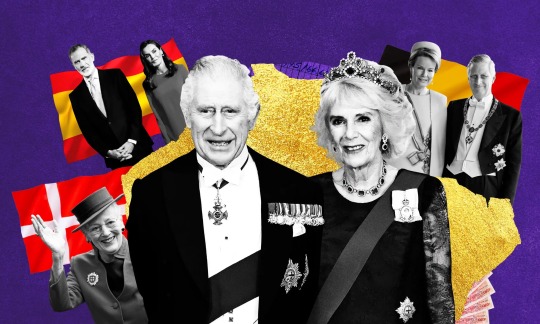
Cost of the Crown: Windsors v Borbones: Comparing the Public Pay of European Filthy Royal Families
Stipends, palace maintenance, staff costs and taxes all differ, but the British royals are given the most taxpayer money
King Charles III and Camilla, the Queen Consort; Denmark’s Queen Margrethe II; Spain’s King Felipe VI and Queen Letizia; and Belgium’s King Philippe and Queen Mathilde. Composite: Guardian Design/AFP/Getty Images/ SOPA Images/REX/Shutterstock/PA
— By Rupert Neate, Henry Dyer and Ashifa Kassam | Wednesday 5 April 2023
Comparing the cost of Europe’s royal dynasties is akin to comparisons between apples and oranges. Each family is unique, and each government has a different way of paying for them. Some royal budgets cover the cost of maintaining palaces, staff and security; others are limited to annual stipends to individual kings or queens.
Tax is paid by some European royals but not others. Some countries are highly transparent, providing detailed breakdowns of how public money is spent on individual royals. Others are more opaque, with royals supplementing an official government lump sum with other quasi-private sources of income. One thing, at least, is clear: European royal families come with vastly different price tags.
United Kingdom 🇬🇧
Members of the British royal family on the balcony of Buckingham Palace for the trooping the colour ceremony in June 2018.
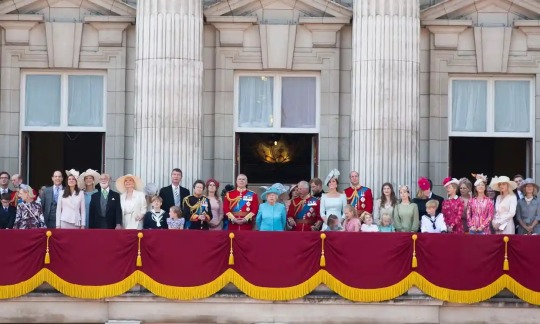
Members of the British royal family on the balcony of Buckingham Palace for the trooping the colour ceremony in June 2018. Photograph: Shutterstock
Family name/House: The Windsors
Monarch: King Charles III
Approximate Public Funding: £86m-£127m
The most famous of Europe’s grand hereditary families, and probably the richest and most powerful too. Many Britons wrongly assume their monarch fulfils purely ceremonial roles, and has no real power. However, an archaic procedure known as “consent” allows the monarch, or heir, to secretly vet laws before they are approved by the elected members of parliament.
It was once used by Queen Elizabeth II to persuade ministers to change the law to conceal her “embarrassing” private wealth from the public.
There is no breakdown of how much individual members of the royal family receive for their official duties. The monarch does receive a lump sum – the sovereign grant –which has risen dramatically over the last decade. The UK taxpayer gave £86.3m towards the cost of the British royal family last year. Of that, £34.5m was spent on refurbishing Buckingham Palace as part of a 10-year restoration programme. The core cost to the taxpayer, for the royal household’s operating costs, travel and maintenance on other residences, was £51.8m.
Controversially, the new king and his heir, Prince William, also receive income from two hereditary estates – the Duchy of Lancaster and the Duchy of Cornwall – which pay no corporation tax or capital gains tax. There has been a centuries-old debate over whether that money – currently more than £40m a year – should really go to the public. Buckingham Palace insists the revenue is “private income” buts says part of it goes towards official duties.
From 1993, the monarch agreed to pay “voluntary” income tax, although they are exempt from inheritance tax, meaning the late queen passed her fortune to the king without any deductions for the public good.
Spain 🇪🇸
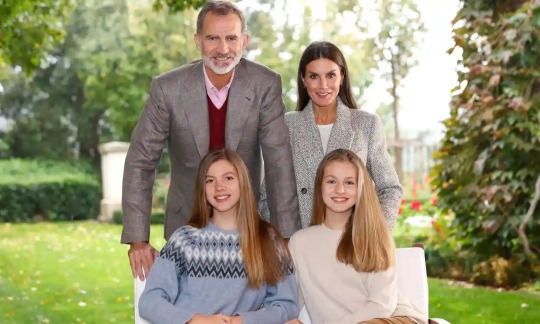
Clockwise from top left: King Felipe, Queen Letizia, Princess Leonor and Infanta Sofia pose for their 2021 Christmas card. Photograph: Zuma/Alamy
Family name/House: The Borbones (or Bourbons)
Monarch: King Felipe VI
Approximate Public Funding: £7.4m
Spain’s royal family ranks among the most beleaguered on the continent. Marred by accusations of corruption, extramarital affairs and a precipitous fall from grace, the former king Juan Carlos I abdicated in 2014 and eventually left the country.
Investigations into his financial dealings were eventually shelved and the former king’s lawyers noted he had been cleared of “any illicit conduct susceptible to criminal reproach”. However, the scandals led to an intense debate among Spaniards about their royal family, who this year will receive €8,431,150 (£7.4m) from the state budget.
Seeking to present a new era of transparency, Juan Carlos’ son, King Felipe VI, made public his personal assets of €2.6m (£2.28m). He renounced his personal inheritance from his father in 2020 and removed him from the royal family’s payroll.
From the public grant, Felipe receives €269,296 (£236,214.10) in an annual personal allowance, while his wife, Queen Letizia, gets €148,105 (£129,911). His mother, Juan Carlos’s estranged wife, Sofía, receives an annual stipend of €121,186 (£106,299). Spanish royals pay tax on their income.
Sweden 🇸🇪
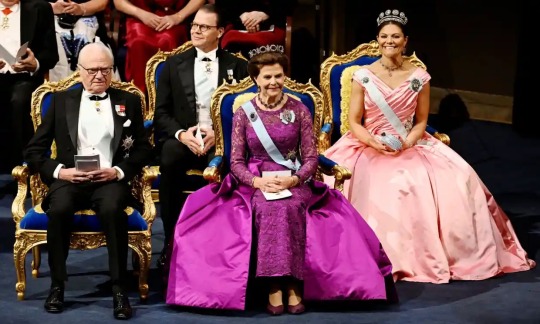
L-R: King Carl XVI Gustaf, Prince Daniel, Queen Silvia and Crown Princess Victoria attend the Nobel prize ceremony in Stockholm in December 2022. Photograph: Christine Olsson/TT News Agency/AFP/Getty Images
Family name/House: The Bernadottes
Monarch: King Carl XVI Gustaf
Approximate Public Funding: £11.5m
Sweden was the first monarchy to change its rules on succession from agnatic primogeniture (the eldest male son) to absolute cognatic primogeniture (the eldest child). The change was passed by the Swedish parliament in 1980, and led to Crown Princess Victoria becoming heir apparent instead of her brother Prince Carl Philip.
The Swedish royal court received a total grant of 147.9m Swedish krona (£11.5m) in 2021 (the latest figure available). Of this, 73.9m kr (£5.8m) covered the cost of the king’s official duties, travel, staff and stables. Within this, 13.6m kr (£1m) was allocated to the king and other titled royals who carry out official duties to cover costs of a “non-official nature which are connected with, or caused by, the royal position”, according to the court’s annual report.
Individually, Carl Gustaf and his wife, Silvia, get 8m kr (£625,423) between them, while Victoria and her husband collect 4.5m kr (£351,800), and Carl Philip and his wife get 1.1m kr (£85,995). In 2019, the king stripped five of his grandchildren of their royal titles in order to reduce the total cost of “appendages” to serving royals.
Belgium 🇧🇪
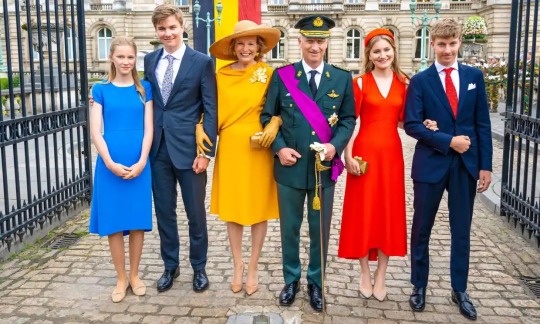
King Philippe and Queen Mathilde with their children (L-R) Princess Eléonore, Prince Gabriel, Crown Princess Elisabeth and Prince Emmanuel at 2022 National Day celebrations in front of the Royal Palace in Brussels. Photograph: Rex/Shutterstock
Family name/House: Van België, De Belgique, or Von Belgien (or “of Belgium”)
Monarch: King Philippe
Approximate Public Funding: £12.5m
Like the British royals, the Belgian monarchy ditched its previous surname, Saxe-Coburg-Gotha, in 1920 in response to fierce anti-German sentiment after the first world war. The new name – van België (Dutch), de Belgique (French) or von Belgien (German) – means “of Belgium” in the country’s three official languages.
The Belgian monarch has had no direct power since 1951, although the king has kept the right “to be consulted by his ministers, to encourage them, and to caution them”.
King Philippe, or Filip, is granted an annual civil list to cover the cost of performing official duties. The amount is established at the start of each reign. Philippe, who acceded to the throne in 2013, received €12.5m (£11m) in 2021, according to the Belgian government’s latest report. The amount is set to increase with the consumer prices index measure of inflation. As well as the £11m paid to Philippe, other members of the royal family receive yearly “emoluments”. Philippe’s father, King Albert II, who abdicated in 2013, receives €980,000 (£862,635); Albert’s eldest child, Princess Astrid, receives €341,000 (£300,161), slightly more than her younger brother, Prince Laurent, who gets €327,000 (£287,838). Their half-sister, Princess Delphine, who had Albert’s paternity recognised by the court in 2020, does not receive any royal funding. The payments are subject to income tax.
Denmark 🇩🇰
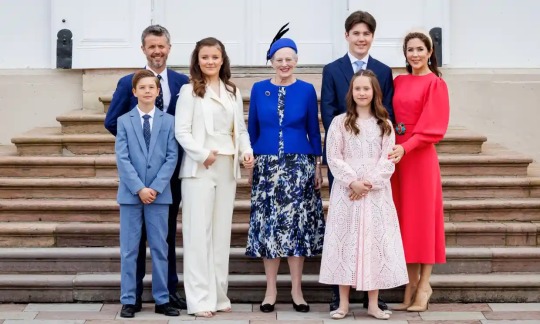
Queen Margrethe II (centre) with Crown Prince Frederik, his wife, Mary and their children (L-R) Vincent, Isabella, Josephine and Christian at Fredensborg in April 2022. Photograph: Patrick van Katwijk/Getty Images
Family name/House: The Glücksburgs
Monarch: Margrethe II
Approximate apublic Funding: £14m
On average, each Dane cycles 1.4km a day, according to the Denmark tourist board, and those cyclists include the royal family. Frederik, the crown prince and heir apparent, competed in the Tour de Storebælt cycle race near Copenhagen; he and his wife, Mary, ferry their children around town on a cargo bike.
Queen Margrethe II, 82, Europe’s longest-serving monarch, receives about 91.1m kroner a year (£10.7m) in civil list payments. The government says this covers expenses “relating to staff, operation of the royal household, administration and properties as well as the queen’s expenses of a more private nature”.
Separately, Frederik receives 22,434,876 kroner (£2.64m) a year, 10% of which goes to his wife. Frederik’s younger brother, Prince Joachim, the sixth in line to the throne, gets 3,965,400 kroner (£467,045) a year. All the money is received tax-free.
Queen Margrethe has stripped Joachim’s four children – Nikolai, Felix, Henrik and Athena – of their royal titles in a move designed to slim down the size of the family. The palace said the queen wanted to “create a framework for the four grandchildren, to a much greater degree, to be able to shape their own existence without being limited by the special considerations and obligations that a formal affiliation with the royal house as an institution implies”.
Luxembourg 🇱🇺
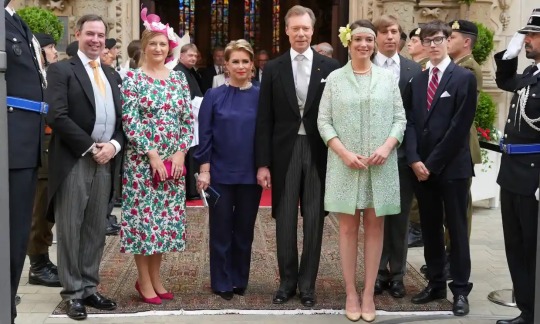
L-R: Crown Prince Guillaume, Princess Stephanie, Grand Duchess Maria Teresa, Grand Duke Henri, Princess Alexandra, Prince Louis and Prince Gabriel outside Luxembourg Cathedral in June 2022. Photograph: Sylvain Lefevre/Getty Images
Family name/House: Grand Ducal Family of Luxembourg
Monarch: Grand Duke Henri
Approximate Public Funding: £16.9m
The Windsors are not the only royals to deliver a Christmas speech. The grand duke’s message is broadcast from the yellow room in the Grand-Ducal Palace every Christmas Eve.
The latest government budget for 2023 shows payments to the Maison du Grand-Duc (House of the Grand Duke) totalled €19,257,155 (£16.9m). Of that, €15.9m (£13.9m) was spent on day-to-day expenses, and €3.3m (£2.9m) on capital projects, such as renovations.
In addition to the civil list payments for staffing costs, the grand duke and his heir receive endowments for personal expenditure: in 2022, Henri received €523,103 (£460,381) and Crown Prince Guilluame received €217,985 (£191,848).
From July, legislation drafted by the prime minister, Xavier Bettel, will peg future changes to the personal allowances to the public sector. Bettel has said the centralisation of royal funding will provide more transparency, after anger at the blurring of public and private budgets. “Now we have a monarchy that moves out of the 19th century and into the 21st century,” he said.
Norway 🇳🇴
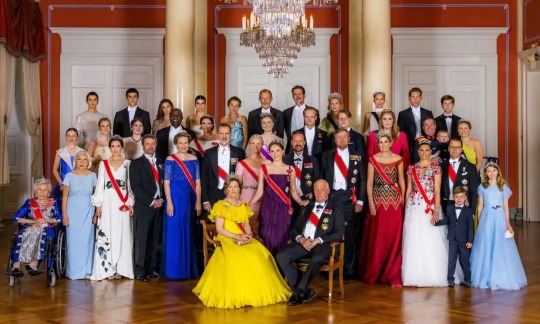
Princess Ingrid Alexandra (C) stands between her grandparents King Harald and Queen Sonja for a family photo to mark her Covid-delayed 18th birthday celebrations in Oslo in June 2022. Photograph: Lise Åserud/AP
Family name/House: The Glücksburgs
Monarch: King Harald V
Approximate Public Funding: £24m
The Norwegian monarchy dates back more than 1,000 years. Harald Fairhair is regarded as the first Norwegian king, who united several “petty kingships” into a single realm in about 885. The current king belongs to the House of Glücksburg, which has held the Norwegian throne since 1905.
The royal court’s latest annual accounts say the Norwegian royal family received 312m Norwegian kroner (£24m) in 2022 in the civil list. It is unclear how this is distributed. A previous report from 2015 states that “the king and queen and the crown prince and crown princess all receive an allowance” to cover “the management, operation, maintenance and development of the private properties and households, as well as appropriations for private expenses and official attire”.
The Netherlands 🇳🇱
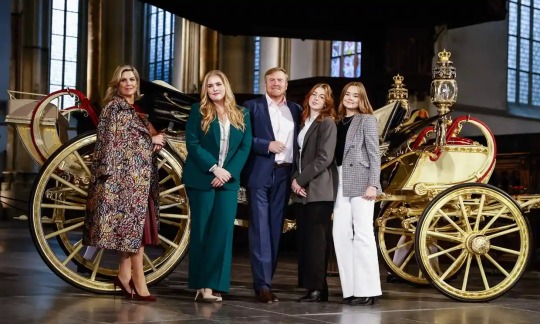
(L-R): Queen Maxima, Princess Amalia, King Willem-Alexander, Princess Alexia and Princess Ariane pose at the New Church in Amsterdam in November 2022. Photograph: Koen van Weel/ANP/AFP/Getty Images
Family name/House: Van Orange-Nassau
Monarch: King Willem-Alexander
Approximate Public Funding: £44.2m
The Dutch royals are among the monarchies exempt from paying income tax. This year, the prime minister, Mark Rutte, rejected opposition demands to scrap the exemption. His government proposed an annual royal budget of €50.2m (£44.2m) for 2023.
That includes €1,035,000 (£911,162) for King Willem-Alexander, and a further €5.37m (£4.7m) to pay for his staff and other expenses. His wife, Máxima, collects €411,000 (£361,823), and an additional €700,000 (£616,245) for staff and expenses. The king’s mother, Beatrix, who abdicated in 2013, receives €1.73m (£1.52m).
Princess Amalia, the 19-year-old heir to the throne, has been granted €1.72m (£1.51m), of which €307,000 (£270,235) is salary and the rest is for staff and expenses. However, she has waived her right to the allowance, saying it would make her feel “uncomfortable” to accept it “until I incur high costs in my role as Princess of Orange”.
0 notes
Text









#parks and recreation#parksedit#parksandrecedit#tvedit#nessa007#noalook#useraurore#tusercarolina#trueloveistreacherous#userives#userlauraj#usersugar#userclara#useriole#userbbelcher#usersource#dailyflicks#chewieblog#cinematv#bylaura#ice town costs ice clown his town crown
1K notes
·
View notes
Text
Elm "I Cannot Let It Be You" Rowan
Elm "Don't. Fucking. Yield." Rowan
Elm "A Hundred Years" Rowan
Elm "I’d Be Your King, But Always Your Servant" Rowan
Elm "There You Are" Rowan
84 notes
·
View notes
Text
I am once again thinking about the reluctant ruler whose arc justly and correctly includes assuming the throne and taking responsibility for the people set before them
#it's about simba coming back to pride rock it's about aragorn using andúril to fight for middle earth and assuming the throne it's about#hiccup marrying astrid and assuming his role as chief and moses returning to egypt#and it's about irina loving her people so fully that when she claims all of her subjects as hers that chernobog must release them to her!!!#and it's about miryem choosing to stay with the staryk and repair the damage and assume responsibility for the land and people!!!!!#and! it's! about! gen!!!!#it's ALWAYS about gen!!!!#gen who didn't want to be king. who hated being king and only wanted to marry a queen but who obeyed his gods and became a king over kings#who lost his home and half his family and his HAND but who ushered in a new golden age.#and it's about sophos who ran away but who shot the ambassador and took back his kingdom#it's about duty and it's about sacrifice and it's always ALWAYS about doing the right thing even at great personal cost because it's about#submitting to a power higher than your own. of recognizing that the calling on life is one for serving others and having so much more to#answer for than just yourself. it's knowing duty is love is duty#i cant stand stories where the answer is 'give up the throne and reject your duty' because no!!! you dont get it!!!#thats how you get the monsters!!! thats how you get the prince turned into a beast and thats how you get every terrible weak king that#aragorn feared becoming#to accept your throne is to die to self!!! you are no longer you but 'king' or 'queen'#it's like queen mary says to qeii in the crown 'elizabeth mountbatten must die#elizabeth regina must take her place.'#that's terrifying! but it's also everything!!!!#die! to! self! die! to! self!!!!!!#lilac rambles#lilac goes to the movies#lion king#prince of egypt#lotr#spinning silver#the crown#tqt#the queen's thief#httyd
188 notes
·
View notes
Text

We were not meant to orbit one another, or to pass in and out of each other's skies. We were always destined to collide, leaving heartbreak and desolation in our wake.
#pulls you closer hey. read crown of feathers trilogy#it's about the cost of war. about the weight of a legacy. about always choosing love and compassion#but most importantly. it's about riding big red birds that can burst into flames#fantasy illustration#fantasy art#artists on tumblr#digital art#my art#fanarts#cough it's been a while since i did a fully colored piece so this is definitely a re-learning experience
21 notes
·
View notes
Text

Kaira Solas Himmerth - The mother who would chop her son's hand off and be thanked for it💀🤺
#kaira#zelda oc#dnd#dungeons and dragons#this is my first oc of all time and i got so fucking sweaty when my dm introduced out of no where into the story like oh fucking shit#and my paladin boy trying to get on her good graces BEGGED with a crack in his voice to give him another chance#it came with a cost of his hand (to be fair he will defend her choice bc he had been cursed/poisoned by smth)#and now he is on a war path to do anything as long as she will accept him back into the family and give him his (figurative) crown#my boy is in full denial gaslit liar and clueless and i am having so much of fun boy he is getting a personality shaped in 4k
27 notes
·
View notes
Text
Betty is so relatable I would do the same shit for my wife
#simon petrikov#original#at#the moment where she declares that she's jumping into the future to save him. just pure save-husband impulse#and maybe she made the wrong choice but I felt the emotion in my gut and that's good tragedy baby#I would do the same thing and then be in the future and realize I probably fucked up but also what else could I do but#devote my entire life and sanity to saving her after I have destroyed every other option??#it's not healthy necessarily but a fucking apocalypse happened and her wife is in eternal torment. what else could she possibly do??#I'm just obsessed with the attitude she has towards saving him and how it turns from joyful heroism to unhealthy obsession#I have a much healthier relationship with my wife. but also she's never been driven mad by a magical crowd for a thousand years!#and Betty did it!! y'all can argue about whether Ice King was better than Simon and I think he must make peace with every part of himself#but it is extremely consistent in the original series that being Ice King is basically this existentially horrifying Eternal torture#so the fact that someone who loved him decided they would save him from that at all costs is very sad and very beautiful#beautiful because no one deserves to suffer forever. tragic because she was far to willing to take his place if she had to.#betty grof#fionna and cake#golbetty#golb#*driven mad by a magical crown#you forgot your floaties#edit: upon rewatching every episode with betty in it i will say i don't think i would be so hellbent on murdering the person she had become#betty does act selfishly and it makes her character more compelling#but i like to think if my wife went banana-pants ice-king-level bonkers i would be able to love that version of her too#but who's to say whether this story would be the reason I responded differently?#it's a good story
104 notes
·
View notes
Text
fancy thinking jewels and gowns don't work as symbols of authority. imagine not making the link between wealth and power. couldn't be me. couldn't be any number of monarchs displaying their authority on their bodies. look at this absurdly expensive frock my wife is wearing. it's worth as much as your house. kneel, peasant, and kiss the hem of her luxurious garment. you're lucky, the next sumptuary laws will ban you from being in the same room as crimson silk.
#i know what they meant but also... no?#even if you interpret a queen's necklace as the cost of a knight on horseback that's an “I CAN BUY A KNIGHT” sign she's wearing.#if every man in the room is holding a sword how do you spot the king? would it be... by his head-jewellery?#(shut up *i* would wear my crown constantly and so did peter o'toole in that homoerotic becket movie)#*dramatic sigh* this is what happens when they let miltary historians write books about the middle ages isn't it?#*wipes my brow with a handkerchief made from imported silk and hand-embroidered with my initials*#*i'm not even sweating i just want to let everyone in the room see that i can afford it*#*continues consuming conspicuously*
11 notes
·
View notes
Text
Filthy Monarchy | Cost of the Crown: How The British Filthy Royal Family Hides Its Wealth From Public Scrutiny
Ahead of the coronation of King Charles III, the Guardian’s Cost of the crown series exposes the entrenched secrecy around the royal family’s money and wealth
— By David Pegg and Paul Lewis
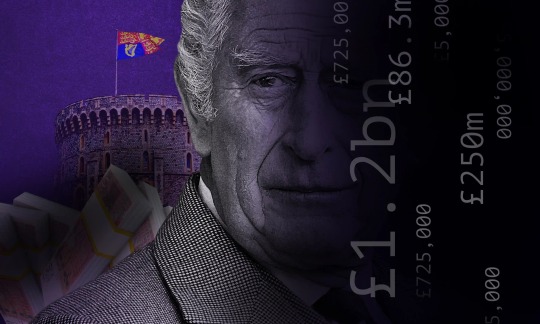
How much money will the coronation of King Charles III cost the British public? What tax rate will our new king pay on his private income? How many engagements did “working royals” such as the Dukes of Gloucester and Kent attend over the last five years? How much were they paid? How much rent do Princesses Beatrice and Eugenie, who are not working royals, pay for residences in royal palaces?
In recent weeks, the Guardian has posed all of these questions to Buckingham Palace. The responses boil down to “ask someone else”, “work it out for yourself”, or simply “you have no right to know”. We beg to differ.
Obituaries of Queen Elizabeth II uniformly applauded her calm stewardship of the realm, or her supposed non-interference in British politics. None mentioned another hallmark of her reign: entrenched secrecy, which has given rise to a culture in which the British people are deprived of the most basic information about the monarchy.

Queen Elizabeth prepares to sign her Commonwealth Day message in 2021. Official papers uncovered by the Guardian revealed how she and her advisers repeatedly abused crown consent to secretly alter British laws. Photograph: Newspix International
Correspondence with the monarch or the heir, whether seismic or harmless, is banned from disclosure. Parliamentary criticism of conduct of royal family members, no matter how disgraced, is prohibited. The palace says the royal archives – the repository of our constitutional monarchy’s history – are open to “any serious researcher”. However they are the private property of the Windsors, who grant their permission before researchers can examine them.
Nowhere is the refusal to let the light in more fiercely enforced by the royals than over financial matters. The wills of even obscure members of the family are censored by judicial decree. The royals closely guard the secrets of their financial wealth, insisting it is “private” even when it is clearly born of their public roles.
It should not detract from Elizabeth II’s achievements to observe how this addiction to secrecy allowed the most unacceptable and corrosive practices to take root. In the past three years, official papers uncovered by the Guardian have revealed how the Queen and her advisers repeatedly abused the procedure of crown consent to secretly alter British laws, including, in 1973, as part of a successful bid to conceal her “embarrassing” private wealth from the public.
Until at least 1968, and very probably after, Elizabeth II’s household did not appoint “coloured immigrants or foreigners” to clerical roles, although they were permitted to work as domestic servants. Even today, Buckingham Palace insists it only complies with non-discrimination law voluntarily. Does the king approve of this? What other abuses have yet to be revealed? And how are they going to come to light when the monarchy is exempt from the Freedom of Information Act (FoI)?
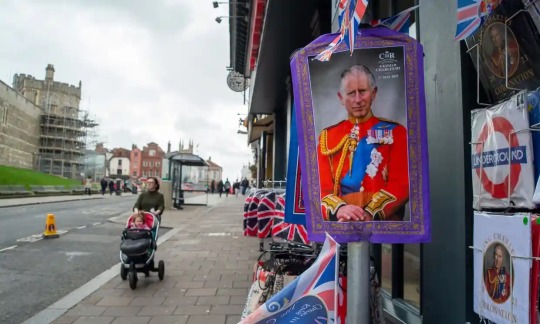
Windsor town, and castle (L), prepare for the coronation of King Charles. How much money will the ceremony cost the British public? Photograph: Maureen McLean/Rex/Shutterstock
Today, the Guardian is launching Cost of the crown, an investigation into royal wealth and finances. In the coming days and weeks, our reporting will reveal information in the public interest about the fortunes that have been quietly amassed by the royals by dint of their public function. Our reporting will also demonstrate the vast challenge of obtaining answers to the most simple of questions.
Take, for example, the question of how much public money is spent on security for the royal family. The government, so often the monarch’s ally over matters of secrecy, claims that to disclose even just a single totalised figure for the entire family, without any further details whatsoever, would constitute an unacceptable threat to their safety.
It refuses to explain this reasoning in any detail, or why heads of state in other developed countries, including French and US presidents, can publish details about the costs of their security.
Instead, an FoI request to disclose the security costs of British royals was rejected, first by the Home Office and then, on appeal, by the Information Commissioner’s Office – forcing the Guardian to instruct lawyers last month to bring a further appeal at the information tribunal. To say it will take months to get an answer would be optimistic.
It took our colleague Rob Evans 10 years and a trip to the supreme court to secure the release under FoI of Prince Charles’s “black spider memos”, which showed how the heir to the throne lobbied senior government ministers on everything from badger culling to alternative herbal medicines. The government spent more than £400,000 on legal costs in an ultimately failed bid to keep the memos secret.
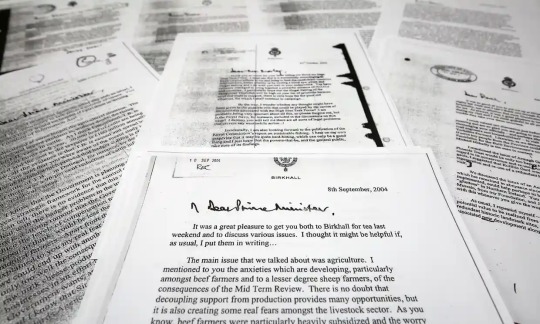
A copy of a 2004 letter from Charles to the then prime minister, Tony Blair; one of a series of his private letters to government ministers published after a ruling by the UK’s highest court. Photograph: Philip Toscano/PA
This is not merely a problem for journalists. Academics, biographers, archivists, activists, curious citizens and even parliamentarians seeking basic information are denied clear answers. Rory Cormac and Richard Aldrich, historians of Britain’s intelligence services, are well acquainted with official secrecy where it is warranted.
“Richard and I have both spent our entire careers trying to write histories of MI5 and MI6,” Cormac said. “We completely understand the need for secrecy around intelligence services. We spend our time going through archives, trying to piece together snippets of declassified material, to arrive at something historically rigorous. We think the intelligence services are the secret state. But they are like WikiLeaks compared to the royal family.”
How Hard Are The Filthy Royals Working For Their Money?
In 1993, John Major’s government published an open government white paper that was ahead of its time in setting out a vision for an informed citizenry, including on royal matters. It declared: “Records relating to the royal family will be treated in the same way as all other records.”
The previous year, Elizabeth II acknowledged in a speech to the City of London’s Guildhall that “no institution – City, monarchy, whatever – should expect to be free from the scrutiny of those who give it their loyalty”.
The clarity of those commitments makes the secrecy in the ensuing decades all the more striking. One stark example is the creation of the sovereign grant, the funding settlement introduced in 2011 by David Cameron’s coalition government.
The previous system for funding the royals, a device called the civil list, had been in operation since the 18th century. For all its flaws, it provided parliament with a breakdown of how much money each member of the family was to be paid. And it gave the elected representatives of the British people a regular chance to debate how much taxpayer money should be handed over to the unelected monarch.
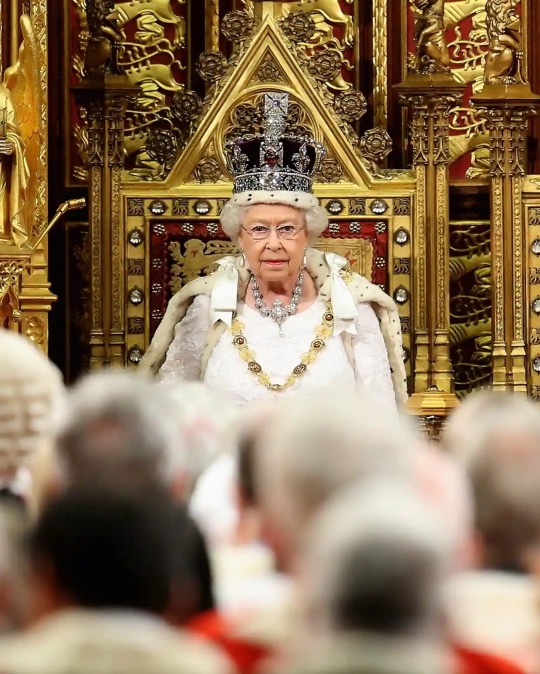
Queen Elizabeth in the House of Lords before the state opening of parliament in 2016. Photograph: Chris Jackson/AFP/Getty Images
Under the sovereign grant, public funding for the royals is set as a proportion of the profits of the crown estate. It has proved to be a financial coup for the royals, who had surrendered the crown estate in 1760.
The Windsors no longer have to endure the civil list ritual of parliamentarians debating how much they should receive. The settlement has proved generous (£86m this year) and an expected windfall in crown estate profits has put the king in the enviable position of having to ask for a reduction in future payments.
Yet our attempt to discover precisely what public functions royals have fulfilled in return for all this money is less than straightforward. The palace directed reporters to the Court Circular, the official record of their activities. However, the information is only available in daily editions, with no totals and no way of easily searching what engagements royals have undertaken in recent years.
To work this out, we first had to drive to the village of Datchet in Berkshire, and the home of Tim O’Donovan, an amiable retired insurance broker who has spent the past 44 years compiling his own paper records of these engagements; archives that he generously agreed to share. We commissioned a team of software engineers to build a machine-learning program to read as many of the circulars as have been digitised and ask it to analyse them in an effort to find answers.
If the UK is going have a royal family as its head of state, surely its citizens should have easier access to information about what exactly they do for them?
What Is Kept Secret From The British Public?
The disparity between how we treat regular public figures and those who happen to have royal blood is made plain when they die. Under British law wills are public, partly to prevent fraud or malpractice by executors. However, the wills of the royal family are routinely sealed by judges. The historical event that gave rise to this custom was the cover-up of a royal sex scandal.
Until 1911, Windsor family wills – other than those of a monarch – were public, like any other British family. The judiciary began censoring them at the request of Queen Mary after the death of her brother, Francis of Teck, in order to conceal from the public his decision to bequeath jewels to a woman with whom he was having an affair.
“Queen Mary wanted them back again,” explains Michael Nash, a lecturer in British constitution at the University of East Anglia. “She called in her legal advisers and she said: I want nobody to know about this. So the will was sealed.”
Members of the family have been able to request their wills be hidden, on account of their bloodline, ever since. Official papers reveal senior government officials seriously doubted the legal basis for this process half a century ago, but it has continued unabated.
After the death of Prince Philip in 2021, the president of the family court, Sir Andrew McFarlane, held a secret hearing from which the media were in effect excluded. The judge went further than ruling that just Philip’s will should be sealed, announcing that the wills of all senior royals should henceforth be secret for a minimum of 90 years.
McFarlane did not fully explain how he reached this 90-year figure in the judgment; it exceeds the normal level of secrecy applied to government papers almost five times over. It means that if Catherine, Princess of Wales, survives as long as her grandfather-in-law, her will cannot be unsealed until the year 2171. Once that period has elapsed, her will could be disclosed to the public. But only, following McFarlane’s ruling, with the Windsors’ permission.
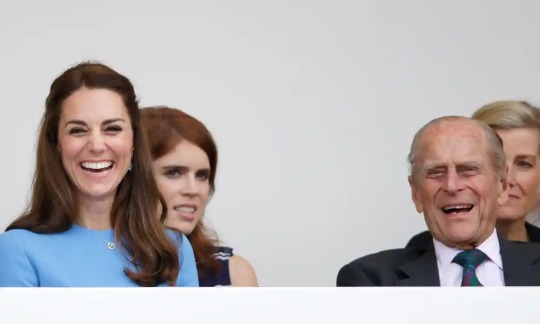
If Catherine, Princess of Wales, lives as long as Prince Philip did, her will cannot be unsealed until the latter half of the next century. Photograph: Max Mumby/Indigo/Getty Images
When McFarlane’s judgment was made public, the Guardian hired lawyers to mount a legal challenge – not over the decision to seal the will, but over the media’s exclusion from the hearing, on the grounds it was contrary to the principle of open justice. We lost the case, after the court of appeal ruled that the media did not have the right to be notified about it.
In their ruling, the judges observed that publicity of the court hearing would have compromised the need to preserve the dignity of the queen and her family’s privacy.
McFarlane’s ruling is being cited by the National Archives to justify banning researchers from other public records discussing the royal family’s wealth. Four files sought by the Guardian concerning bequests of obscure members of the family – Helen, Duchess of Albany; Alastair, Duke of Connaught and Strathearn; Princess Victoria, and Princess Arthur of Connaught – are now sealed.
Challenging Questions For The King
Last year, the veteran broadcaster David Dimbleby, who helmed the BBC commentary of the queen’s funeral, broke with custom to advance an opinion that some might categorise as political. Speaking at a literary festival, he complained about Buckingham Palace’s attempts to steer the state broadcaster’s coverage, and complained that the BBC had an “old sore about the monarchy”.
The corporation, he said, “would not go near things like the power that the palace has to change taxation legislation”, or ask whether the Duchy of Cornwall, a business portfolio that controversially generates profits for the Prince of Wales, should pay tax.
“All those issues are never touched by the BBC because I think they feel their viewers will not like it – a visceral feeling,” he said. “It is not discourteous to question, it is not rude, it is important, because the way we are governed is important, and the way our constitution works is important.”
In the coming weeks, the Cost of the crown series will ask challenging questions of the new king. Questions about the personal enrichment of his family, and the extent to which they have profited from their public roles. Questions about the dubious origins of some of their wealth. And questions about whether the public is getting value for money for the record sums it gives over each year to fund the Windsors and their lavish lifestyle.
Buckingham Palace argues that the financial arrangements of royals should “remain private, as they would for any other individual”. But the mist that shrouds such questions comes from the confusion over what can legitimately be called the royals’ private wealth, what belongs to the British people, and what, as so often is the case, ambiguously straddles the two.
These are not easy topics for King Charles to confront. He may prefer that we were not raising them on the eve of his coronation. But we believe the time is right.
• Cost of the Crown Reporting Team: David Pegg, Rob Evans, Maeve McClenaghan, Felicity Lawrence, Henry Dyer, Severin Carrell, Manisha Ganguly, Rupert Neate, Greg Wood, Harry Davies, David Conn, Aamna Mohdin, Lucy Hough, Maya Wolfe-Robinson and Richard Nelsson.
#Cost of the Crown#Filthy Monarchy#Adulterer King Charles III#Queen Elizabeth II#Prince Phillip#UK 🇬🇧 News#Freedom of Information#Information Commissioner#David Pegg#Paul Lewis
0 notes
Text
dude there’s a clothing store where I live that has a bunch of plushies like hanging at the window outside for sale and I’m not joking they have a skibidi toilet plushie i wanted to take a picture of it for you guys to see so bad but when i returned with my phone the store had already closed and the guy had put the plushies back inside but I’ll be back tomorrow or in the nearest future I need to see it again to make sure I didn’t dream it
#they also have a sad pou one and i wanted it sooooooooooooooooooo badly but it cost 150 crowns and as reasonable a price as that is#I just don’t have that kind of money rn but he will be mine one day#mp
13 notes
·
View notes
Text
Finished Kingdom of Ash today, effectively completing TOG. I will need a week to process. I will be requesting bereavement time at work. I will not be recovering from this I fear.

#now I have read all SJM books#but at what cost#I feel empty#I’m ready for hofas now#throne of glass#kingdom of ash#crown of midnight#empire of storms#heir of fire#assassins blade#queen of shadows#tower of dawn
37 notes
·
View notes
Text
My insurance sent me another request about a letter for my dentist 🙄
Looks like I might be getting that tooth pulled anyway. We'll see.
#if the out of pocket cost for the crown is in the 500 dollar range my dad said he could help#but lmao i doubt it'll be that cheap
2 notes
·
View notes
Text
the way you buy dlc for eso is so stupid. why can't i just pay with real money on steam or something
#and expensive as hell holy shit#it is gonna cost me twice as much for a few dlc as all of the chapters up to date did#mine#2 dlc with crowns on sale cost as much as the base game with all of the major chapters when on sale#thats fucking dumb#and i want to buy now that there is a sale#but man i dont want to spend that much at once#and no im not getting eso plus. i refuse. i think its such a shitty irritating idea i refuse to give into it
20 notes
·
View notes
Text
the exercise book I have for my driving studies is so annoying because there will be exercises where you're supposed to connect the letters to different statements but the letters always spell a fucking word so if you have two brain cells you figure that out and don't do the exercise. like there was just one about the order of signs before a train crossing with the different signs marked with the letters IRTNA which of course spells TRAIN. It's such a stupid thing, please just put ABCDE so cheaters like me actually have to learn.
#I hate studying driving with a passion#I don't even study my Portuguese which has a clear interest and significance in my life#how do they believe I'd study driving which feels so unimportant#girl I woke up at 5 am to go to high school over an hour away for three years I think I can handle going anywhere by public transport#the lessons never end they're costing me 400000 million crowns and I dread them every time#snicksnack#anyway let me read this stupid chapter on mindre landsväg#actually let me not I got too angry
6 notes
·
View notes
Text
People keep on tearing down Rhaelys in the tags (or, rather, Corlys), and it's making me mad.
#out of high tide ( ooc )#//is he the perfect husband? no#but he DOES love her even if avoidance is his fallback tactic when something goes wrong#and he presses for some kind of grip on the crown that she says she gave up on (i don't think that's entirely true but that's another post)#at the cost of their family but he's still one of the three best men on the show (the others being harwin and laenor)
6 notes
·
View notes
Text
Benedict: Your pardon‚ my lord‚ Your Highness‚ but our fight is far from over.
#(speaker) benedict#(context) chapter xiv - part i: a steep cost#(event type) main story cutscene#(location) glenbrook's crown city: city streets#ts dialogue bot
2 notes
·
View notes